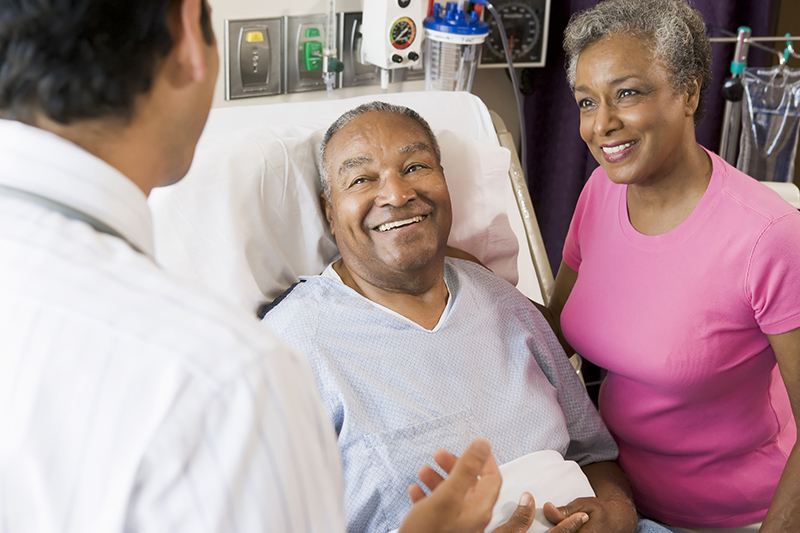
Senior Couple Talking,With Doctor smiling
With its parallels to dementia, delirium is often a complicated problem to identify and manage. Older adults are especially vulnerable to delirium, so our senior care professionals have put together the following information that will help you recognize and respond appropriately if you suspect delirium in elderly loved ones.
What are the symptoms of delirium in the elderly?
Much like dementia, delirium in the elderly involves confusion, disorientation, and other changes in mental status. The important contrast, however, is the onset of these symptoms. In dementia, there is a gradual decline in cognitive functioning; with delirium, the transformation is sudden.
There are two types of delirium:
- Hypoactive delirium is the most prevalent type, impacting roughly three-quarters of people with delirium. It can display similarly to depression, with listlessness and a slowed reaction time. Other indications include a flat affect, withdrawal from social/once enjoyed activities, and apathy.
- Hyperactive delirium causes disorientation, anxiety, hallucinations, restlessness and agitation, difficulty concentrating, rambling, and sudden changes in emotion.
It’s important to keep in mind that both kinds of delirium can be experienced concurrently, with the person feeling drowsy and listless one moment followed by feeling agitated and alert the next.
Who is typically subject to delirium?
People at increased risk for delirium include:
- People who have been hospitalized or had surgery (as many as 10 – 30% of patients)
- People who are getting close to the end of life
- Intensive care unit patients
- Seniors over age 75, specifically those residing in nursing facilities
- People clinically determined to have certain ailments: HIV, liver disease, cancer, stroke, or Parkinson’s disease
- Individuals getting dialysis
- People who take multiple medications or who are diagnosed with multiple chronic illnesses
- Those who are hearing- or seeing-impaired
What can cause delirium?
The root cause of delirium can be tough to pinpoint, but there are several known contributing factors:
- Dehydration
- Lack of sleep
- An overwhelming response to an infection
- Alcohol or drug withdrawal or overdose
- Side effects of certain medications
- Hypothyroidism and hyperthyroidism
- Renal or liver problems
- Pain
What should you do if you suspect a loved one is delirious?
Contact the senior’s healthcare provider immediately for an evaluation. They may do some simple preliminary tests, such as asking the person to solve a simple math problem or to spell a short word backwards. A physical exam, blood and urine tests, and imaging tests such as an MRI, CT scan, or x-ray may be ordered to help diagnose the cause.
What treatment is available for delirium?
The medical condition or other cause of the delirium must first be determined and treated. Hospitalization is oftentimes needed to allow for continuous monitoring of the delirium itself as well as the treatment being delivered. Options can include:
- Fluids/electrolytes in the event that person is dehydrated
- Antibiotics for any infections
- Antipsychotic medications to help ease hallucinations and agitation
- Benzodiazepines if the delirium is related to alcohol or drug withdrawal
What can you do to help?
If caring for the individual with delirium at home, the following suggestions can help:
- Reassure the person that everything is fine and that you’re right there.
- Play comforting music that the person enjoys.
- Provide nutritious meals and make certain the individual is drinking plenty of fluids.
- Engage together in conversations to orient the individual.
- Motivate the individual to stay physically active (based on the doctor’s recommendations).
- Try to establish regular sleeping patterns by keeping the home bright throughout the day, limiting daytime napping, and creating a calm, dark, quiet atmosphere at night.
Live Free Home Health Care, an award-winning provider of home care services in Bristol, NH and the surrounding areas[5] , can be a huge help as well for a person with delirium. We’re here for as much or as little assistance and support as needed, day or night. Give us a call at 603-217-0149 for a complimentary in-home assessment to find out more about how we can help with delirium in the elderly or any other care need at home.
